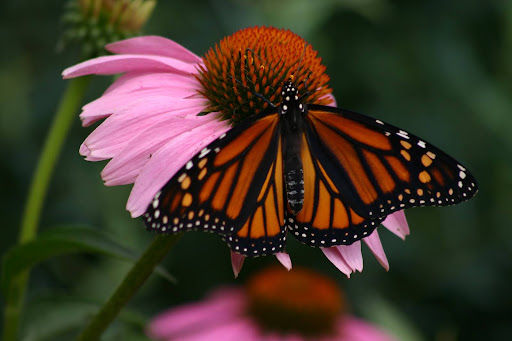Garden Advice for Summer 2025
- Jun 1, 2025
- 4 min read
6/07/2024
Ramsey County Master Gardener Volunteer Program

A monarch visits a purple coneflower in July.
A Note from the Master Gardeners
Thanks to everyone who stopped by our plant sale at Aldrich Arena a few weeks ago! Proceeds from the sale will be invested in our programs across Ramsey County. We're grateful for your support!
Plant sales like ours are increasingly stocking native perennials due to customer demand! Are you interested in restoring Minnesota's ecosystems and supporting our pollinators? Check out this article for tips on choosing well behaved plants for your landscape.
After a bit of weather whiplash this spring, the gardening season is now in full swing! We look forward to seeing you at farmers markets, yard waste sites, summer classes and many community events in the coming months.
As always, you can write or call us with your questions, or visit the Extension website for helpful information.
— Your friendly neighborhood Master Gardener
Summer Garden Activities
JUNE
Plant any remaining warm season annuals now that danger of frost has passed
Weed, mulch, and water wisely!
Watch for Japanese Beetles and other pests — manage as they emerge
Deadhead flowers to encourage new growth
JULY
Fill empty late-season space in your garden: Check out this list of what can still thrive when planted in July
Watch for extreme heat, and be cautious of herbicide and pesticide use in hot conditions
Continue to pinch and deadhead flowering plants (including weeds)
Prune spring-flowering shrubs
AUGUST
Harvest annual flowers and vegetables
Begin collecting seeds from spent annuals for next year
Consider late summer/early fall lawn care, including seeding, fertilizing and aerating. Check out this guide to turfgrass seed from the UMN Extension.
Plant cover crops in annual garden spaces
Summer 2024 Garden Information
Heatwave makes vegetables misbehave
When the weather heats up, gardeners often report disappointing yields in their vegetable beds: bushy cucumber plants with no fruit, tomatoes not ripening, and beans with no flowers. Be prepared for summer with this guide on common heat-related concerns.
The risks of pesticides to pollinators
Pesticides used to kill pests, diseases, and weeds can harm pollinators and other beneficial insects. They can remove important flowers (food) and impact bee reproduction, navigation and memory. Exposure to pesticides can also multiply the effects of other stressors on pollinator populations, such as loss of habitat and exposure to pathogens and diseases. Learn more with this resource from UMN Extension. Extension also has a complete guide to building landscapes that support pollinator health.
Protect your plants from common pests
Our warming winters are making it easier for insect pests to thrive across the state. This winter wasn’t particularly cold as compared to historical averages, but the combination of timely cold snaps with little-to-no snow cover pushed soil temperatures down to levels we have not seen in a few years. Read more about what this might mean for various insect populations this year.
Long-term biological control of Japanese Beetles
If you regularly battle Japanese beetles in your garden, watch for the Winsome Fly, which has been introduced as an effective biological control agent. This fly is parasitoid and uses the beetle as a host. If you see infected beetles (identified by white spots on the beetle’s head or back), leave them in the environment to help Winsome Fly populations grow! Eggs are usually laid just behind the head of the beetle but may also be found on wings. Winsome flies prefer to lay its eggs on female Japanese beetles and their larvae will kill the beetle shortly after they hatch.

(Image A) Winsome fly eggs laid just behind the head and hind wing of Japanese beetle. The distinctive white eggs are easy to observe in the field. (photo: E.R.H. Cervantes) (Image B) Winsome fly eggs on mating pair of Japanese beetles.
Become a community climate leader
It’s likely you’ve noticed the climate already shifting: shorter winters, smokier skies, heavy rains and flooding. These changes affect how we live, work, and play across Minnesota. So, what can we do about it? The good news is you don’t have to be a climate expert to have an impact. It’s going to take all of us, using everything we have, to make a difference. The Community Climate Leaders Program will teach you how to take climate action in your community and connect with a network of peers doing similar work.
Learn how to identify bees
There are thousands of insect pollinators in MN, including over 500 species of native bees. Summer is a great time to tune in and start to notice how many different bees you can find in your yard. Looking to start identifying some of the species? The UMN’s Bee Lab has a handy FAQ and guides to reference.
Donate extra produce
Often find yourself with far too many zucchini, tomatoes, melons or herbs? Don’t let it go to waste. There are several opportunities to donate extra produce in Ramsey County. Check out this guide on our website to different programs and locations.
Visit the new Ramsey County recycling center
The new Ramsey County Environmental Center is open in Roseville! Drop off household hazardous waste and electronics, household recycling and food scraps all in one place.
More Resources to Help you Grow
Ask a Master Gardener Online & Phone Services
Ramsey County Yard Waste & Food Scraps Drop-off Locations


